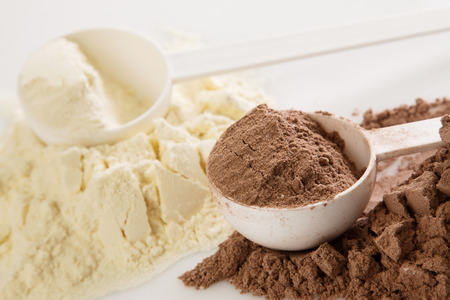
by Stephanie Margolis, R.D.
Do I Need a Protein Supplement?
Protein powder. They are fast, easy, and everywhere! While the industry has seen an uptick in the past, today we are looking at a 28-billion-dollar industry that has forecasts of growth to 45 billion or more by 2020. So why does it seem like everyone is reaching for the scoop in the giant container?
Why Protein Matters
Protein is an essential macronutrient that is used in every cell in your body. The primary role of protein is to build and repair tissue. This is especially true for those who exercise because when you work out, your muscles sustain little micro tears. Your body then uses protein to go into those little micro tears and builds and repairs the tissue, allowing the muscle to grow stronger. Nevertheless, protein is not stored in the body so it’s important to consume adequate amounts on a regular basis. On a less molecular level, protein in meals helps you feel more satisfied and feel full longer.
Can I Get Too Much?
Yes! I hear all the time the call for more protein in the diet. Moooore protein! But the truth is, consuming large amounts of protein means whatever your body doesn’t use can just be excreted out through the urine. If you are consuming large amounts of dietary protein on top of a supplement it is likely that the supplement is not doing much good in your body and is simply being excreted. Protein is also more difficult for the body to digest and can put extra work on the kidneys to clear it from the body. Getting adequate amounts of quality, whole foods like meat, poultry, fish, nuts, and beans should be the primary way you meet your protein needs.
Do I need a Supplement?
Keeping a quality protein supplement on hand can be a good idea for a quick snack, a way to add protein to meals, and a good Plan B when mom-life gets too busy to stop and eat. However, relying on protein powders to meet your nutrition needs, or thinking that drinking a protein shake will negate other bad eating habits is not the way to go. Your focus should always be on getting your nutrition from wholesome, unprocessed foods first.
But, which One?
There are many supplements out on the market and it can be hard to narrow it down to the right one for you. You’ll see protein powders from two main groups: animal-based and plant-based. Plant-based is the preferred choice because animal-based protein powders (whey and casein) are known to cause some bloat and intolerance for those who may be lactose sensitive. These powders also tend to be very heavily processed but if you choose to go this direction look for powders that say cold processed, hormone-free, grass-fed, tested low for heavy metals, and does not contain sucralose.
Plant-based protein powders do not cause bloat the same way animal-based powders will, and they are less likely to be made with artificial sweeteners. Additionally, research has shown these powders are just as effective at promoting muscle formation as whey or casein based formulas. Look for pea, hemp, or rice powders (or even a blend!) along with other sprouts or plants to make sure you are getting the most bang for your buck. Look at the ingredients for a blend of ingredients with no added artificial sweeteners.
Bottom Line:
It’s not a bad idea to have a plant-based protein powder on hand to fill in the gaps, but do not rely on it daily. You will find our recipes do not include protein powders. We fill our recipes with good, wholesome, earth-made ingredients. Although you will often find added omega 3’s through chia and flaxseed included in our recipes.
What about your kids?
A protein supplement is a good idea only if they aren’t getting enough. Most kids are getting enough protein, but not enough fruits and vegetables. Discuss a protein supplement with your pediatrician – outside of disease management, there has not been a lot of research on protein supplementation in kids.